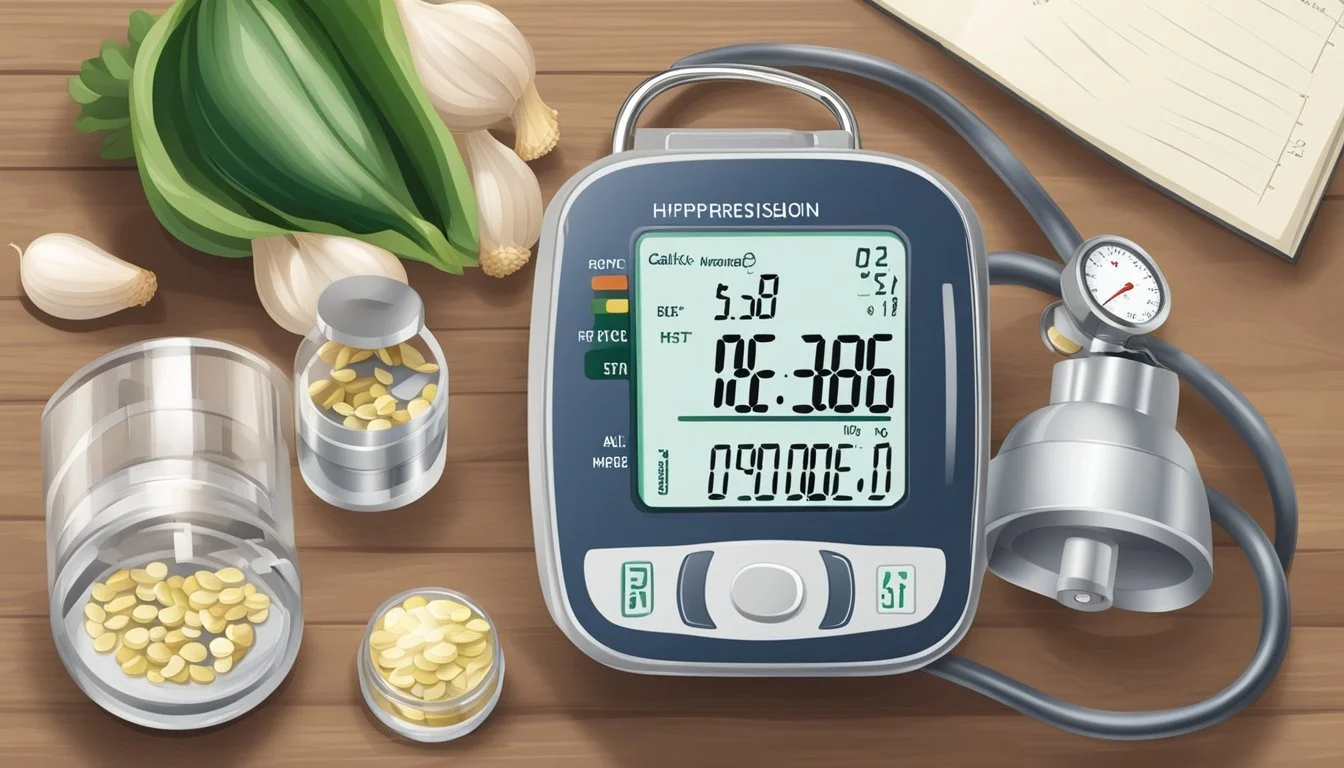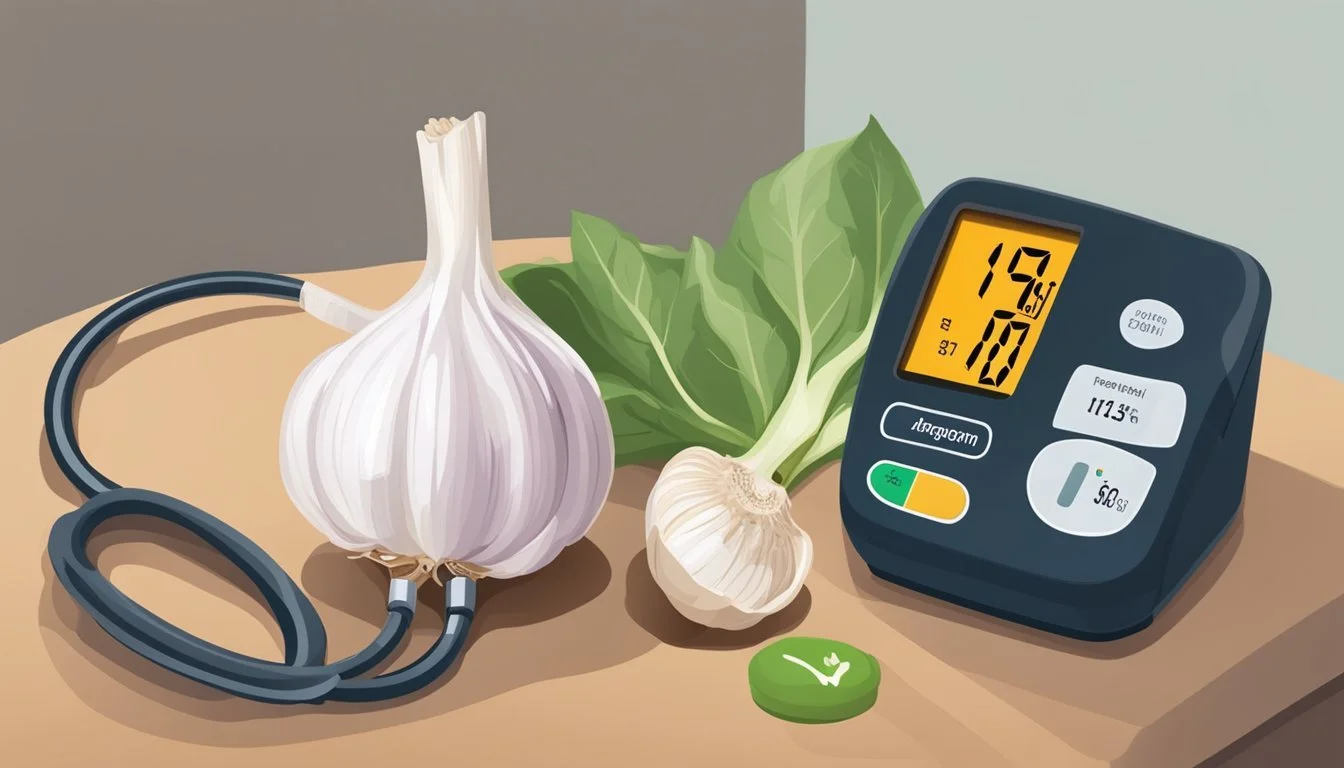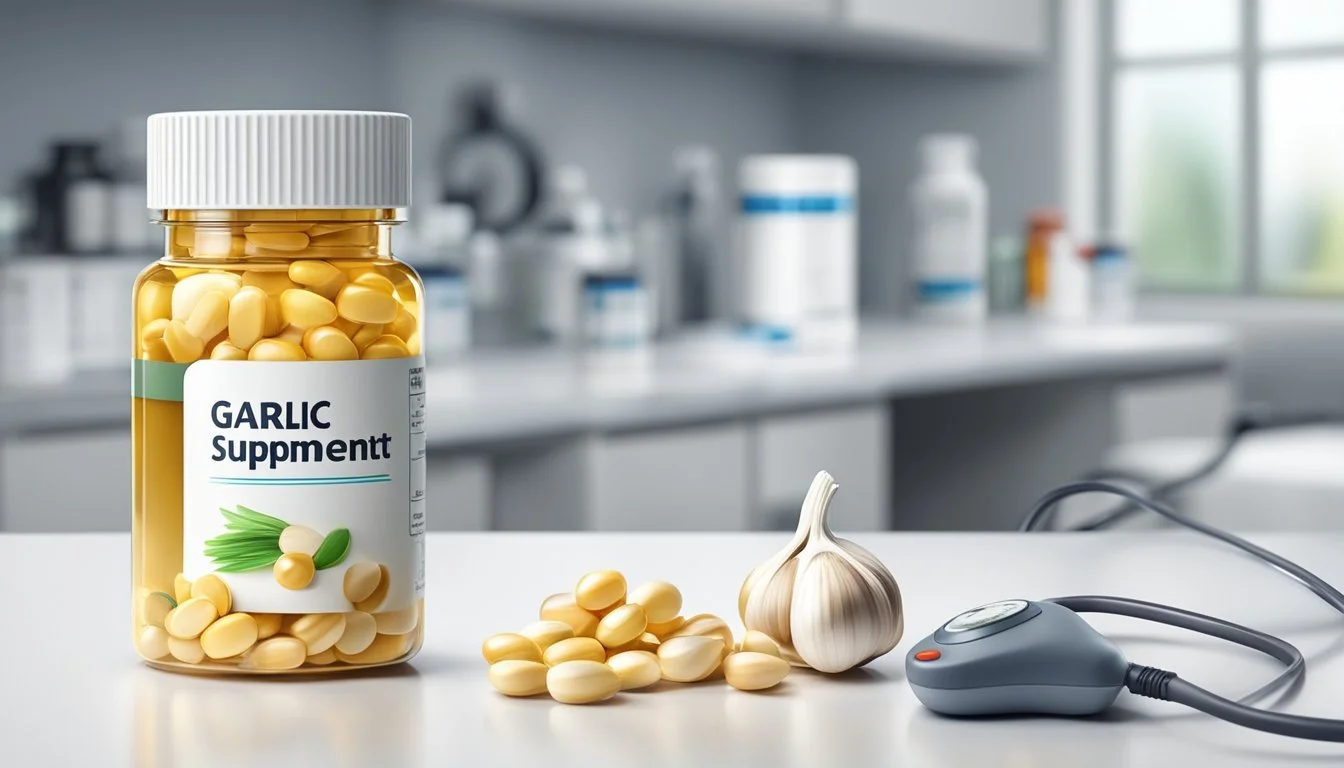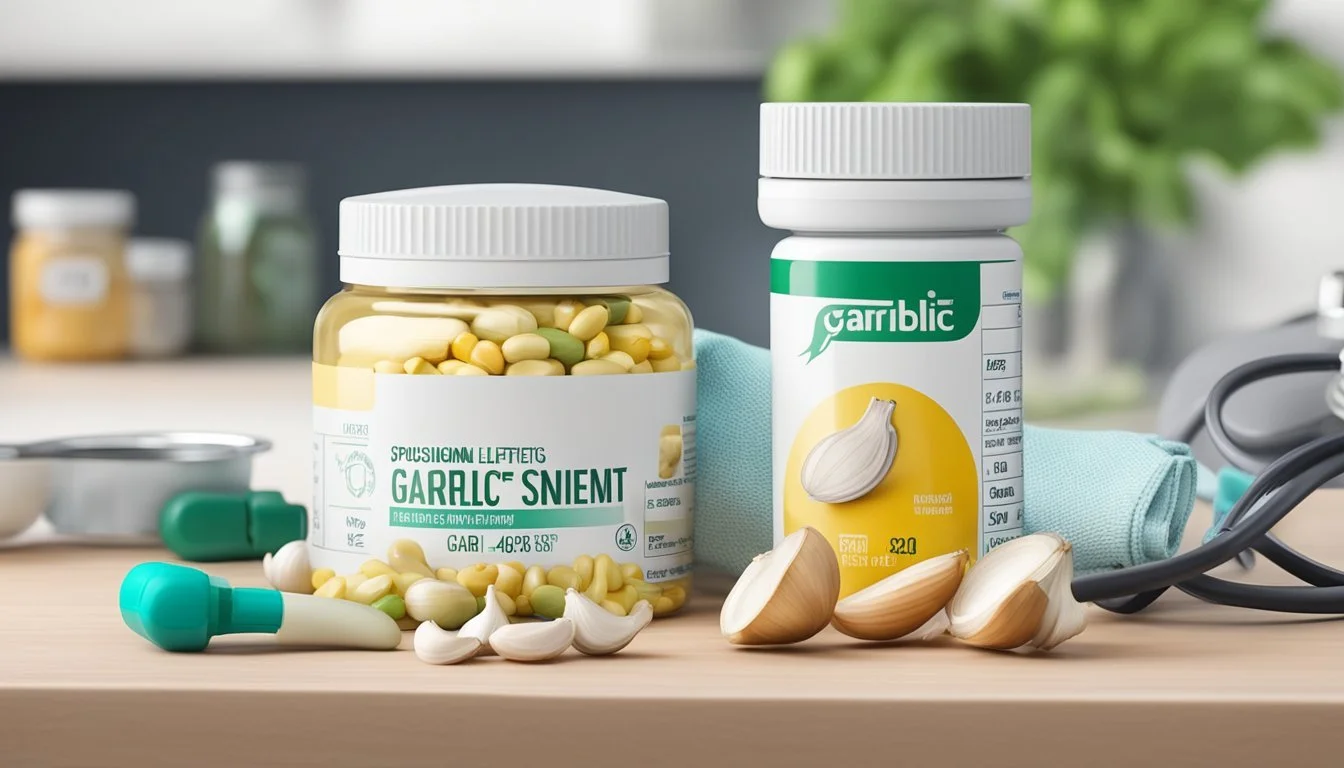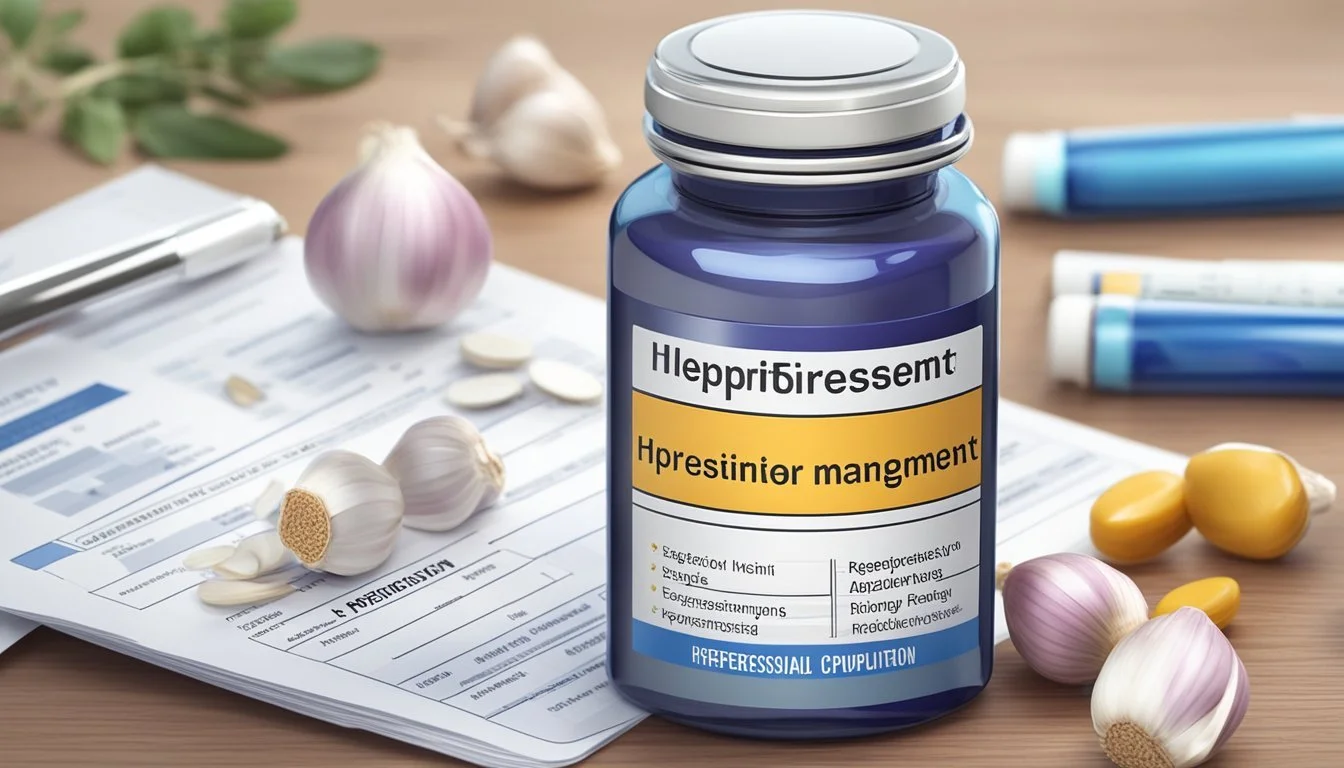Is It Safe to Use Garlic Supplements for Managing Hypertension?
Uncovering the Facts
Controlling hypertension is a critical health priority, given that prolonged high blood pressure can lead to serious cardiovascular diseases. Among various natural remedies purported to benefit those with hypertension, garlic (What wine goes well with garlic?) supplements have emerged as a subject of interest in the medical community. Research suggests that garlic, specifically in the form of dietary supplements, may have the potential to lower blood pressure in individuals with hypertension. This has been observed in various forms such as raw garlic, garlic powder, and aged garlic extracts, indicating a trend towards positive outcomes when garlic is used in controlled dosages.
Clinical evidence indicates that the effectiveness of garlic supplements is comparable to standard anti-hypertensive medications in some cases. However, the safety and efficacy of using garlic supplements as a primary or adjuvant therapy for managing hypertension necessitate careful consideration. The compounds found in garlic are believed to promote vasodilation, which helps to reduce blood pressure, yet the dosage and form of garlic, as well as the duration of intake, play essential roles in determining its therapeutic impact.
While garlic is generally considered safe for consumption, the use of garlic as a supplement carries considerations such as possible interactions with prescription medications and the risk of side effects or complications in certain health conditions. Therefore, it is advised that individuals contemplating the use of garlic supplements for blood pressure management consult with healthcare professionals to ensure an informed and safe approach to their use in hypertension management.
The Prevalence of Hypertension
Hypertension, commonly known as high blood pressure, is a significant health concern worldwide. It occurs when the force of blood against the walls of the arteries is consistently too high, often leading to heart disease, stroke, and other health problems.
According to the Centers for Disease Control and Prevention (CDC), prehypertension is defined as a systolic blood pressure (SBP) between 120-139 mmHg or a diastolic blood pressure (DBP) between 80-89 mmHg. Hypertension is defined as SBP equal to or above 140 mmHg, or DBP equal to or above 90 mmHg.
The CDC’s data brief from 2017 highlights that hypertension remains a pervasive condition in the United States.
The report reveals that 29% of adults were classified as hypertensive during 2015-2016, illustrating the extensive reach of this condition.
Hypertension typically develops over years and it can be influenced by various factors, including dietary habits, lifestyle, age, and genetics. Untreated, it can lead to severe health complications, making its management a key focus for healthcare providers. Monitoring blood pressure and employing strategies like dietary changes are central to controlling this condition's prevalence.
Understanding Garlic and Its Medicinal Properties
Garlic, a widely used herb with a rich history in traditional medicine, is celebrated for its potential therapeutic effects, particularly in managing hypertension. This section explores its origins, key compounds, and historical applications.
History and Composition of Garlic
Garlic, scientifically known as Allium sativum, is an edible bulb that's been used for its medicinal properties since ancient times. It is composed of several nutrients, including vitamins and minerals, and it's particularly rich in sulfur-containing compounds. These components are responsible for garlic's distinctive aroma and potential health benefits.
Allicin and Its Health Benefits
Allicin is a notable compound formed when garlic is chopped or crushed. As a natural antioxidant and anti-inflammatory agent, it may contribute to health benefits such as reducing oxidative stress and inflammation in the body. Studies have suggested that allicin and other sulfur compounds in garlic could have a positive effect on blood pressure levels, though more research is needed to fully understand their mechanisms of action.
Garlic in Traditional Medicine
In traditional medicine, garlic has been utilized for a multitude of ailments due to its purported anti-inflammatory and antimicrobial properties. Its use spans cultures and includes the treatment of respiratory problems, digestive disorders, and to bolster the immune system. These practices laid the groundwork for modern interest in garlic's role in health, particularly in managing conditions like hypertension.
Garlic Supplements and Blood Pressure
Garlic supplements, often used for health benefits, have been associated with blood pressure management. This relationship is subject to the form of garlic used and the specifics of individual health conditions.
Types of Garlic Supplements
Different forms of garlic supplements include aged garlic extract, garlic oil, and garlic powder. Doses of these supplements can vary widely, from about 12.3 mg to 2,400 mg daily, and the durations of the studies that have examined their effects on blood pressure range from 2 to 24 weeks.
Aged Garlic Extract: Typically comes in a liquid form and has been the subject of various studies.
Garlic Oil: Another common supplement form that purports to offer the benefits of garlic in a concentrated oil.
Garlic Powder: Often available in capsule form, it provides an altered dosage of garlic without the need for food preparation or fresh garlic taste.
These supplements are targeted at providing convenient ways to consume garlic with a potential to affect health markers such as blood pressure.
The Role of Garlic in Blood Pressure Regulation
Garlic supplements are thought to have an impact on blood pressure regulation through the production of substances like nitric oxide and hydrogen sulfide, which can help to relax and dilate blood vessels, potentially lowering systolic and diastolic blood pressure. The effectiveness of garlic in regulating blood pressure has been a subject of research, with some studies indicating potential benefits.
Garlic Extract vs. Garlic Powder
When comparing garlic extract with garlic powder, it is important to note that different forms can have varying levels of active compounds. Garlic extract is believed to retain more of the beneficial compounds compared to garlic powder since some of these compounds may be lost during the powdering process. Here's a basic comparison:
Form Composition Considerations in Blood Pressure Management Garlic Extract Higher concentration of bioactive compounds Potentially more effective in dilating blood vessels Garlic Powder Convenient, may have fewer active compounds Could be used as a dietary supplement with a lower impact
Individuals considering garlic supplements for hypertension should consult with healthcare professionals to ensure personalized advice and to account for any potential medication interactions or side effects.
Clinical Research on Garlic Supplements
Recent clinical research has consistently explored the relationship between garlic supplements and their effect on hypertension management. These studies shed light on the efficacy and safety of garlic as an alternative or complementary treatment for high blood pressure.
Randomized Controlled Trials on Garlic for Hypertension
Randomized controlled trials (RCTs) serve as the gold standard for determining the efficacy of treatments due to their ability to reduce bias. Pointedly, many RCTs have investigated garlic supplements and their impact on blood pressure. One study, mentioned in the search results, highlights Kyolic aged garlic extract as having a comparable effect to standard anti-hypertensive medications in reducing blood pressure in subjects with uncontrolled hypertension. This trial emphasizes that subjects taking garlic supplements showed a significant decrease in systolic blood pressure (SBP).
Meta-Analysis of Garlic Supplement Studies
A meta-analysis, which pools data from multiple studies, can provide stronger evidence by assessing the consistency of research findings. According to an identified study, a meta-analysis in the Journal of Human Hypertension suggests Coenzyme Q10 in conjunction with garlic may benefit patients with hypertension. Specifically, the analysis points to a meaningful drop in blood pressure with a confident interval suggesting a low chance of this effect being due to random variability. However, it is crucial to note the potential heterogeneity among studies could affect the robustness of such pooled results. Pubmed, a reliable resource for identifying comprehensive literature, includes several meta-analyses indicating that garlic supplements could be beneficial for individuals with high blood pressure, often focusing on their antioxidant, anti-inflammatory, and lipid-lowering properties.
Potential Benefits of Garlic Supplements
Garlic supplements are widely recognized for their health-promoting properties, particularly in relation to cardiovascular health and immunity. Decades of research suggest that garlic can contribute to the reduction of several risk factors associated with cardiovascular disease.
Garlic's Impact on Cardiovascular Health
Garlic supplements have been shown to have a positive effect on cardiovascular health in several ways:
Cholesterol: Garlic is associated with a modest reduction in levels of total cholesterol, particularly LDL cholesterol, which is often referred to as "bad" cholesterol.
Blood Pressure: Studies suggest that garlic may cause a reduction in systolic blood pressure (SBP), thereby playing a role in managing hypertension. This is particularly important because elevated SBD is a significant risk factor for cardiovascular events.
Arterial Stiffness: Evidence from research indicates that garlic supplementation could reduce arterial stiffness. This is crucial as increased arterial stiffness is a predictor of cardiovascular morbidity and mortality.
Overview of Additional Health Benefits of Garlic
Beyond cardiovascular health, garlic supplements may offer further health benefits:
Immunity: Garlic's potential antimicrobial properties suggest it may support the immune system, possibly helping to prevent colds and other infections.
Anti-inflammatory: Garlic has been identified to possess anti-inflammatory properties. While inflammation is a natural bodily response, chronic inflammation is linked to a variety of illnesses, and reduction in inflammation supports overall health.
By understanding garlic's impact on health and the potential benefits it may hold, consumers can make informed decisions about including garlic supplements in their health regimen.
Safety and Adverse Effects
Garlic supplements are commonly used for managing hypertension but must be considered cautiously due to potential side effects and interactions with other medications.
Evaluating the Safety of Garlic Supplements
Garlic supplements, similar to their culinary counterpart, have been deemed generally safe for most individuals when consumed in recommended doses. Safety evaluations focus on their history of use and clinical studies which have generally reported minor adverse effects. Long-term use up to 7 years has been recorded without serious safety concerns. However, not all effects are known, especially in hypertensive patients who may react differently to these supplements.
Common Side Effects and Interactions
Common side effects reported by individuals taking garlic supplements include:
Gastrointestinal Issues: Heartburn, gas, and diarrhea, with raw garlic potentially exacerbating these symptoms.
Odor-related Issues: Bad breath and body odor.
Other Possible Discomforts: Nausea, vomiting, and a dry mouth.
Concerning interactions, garlic supplements can affect blood clotting due to their potential antiplatelet properties. This is particularly relevant for individuals taking anticoagulant medications. Using garlic in conjunction with other medications that influence blood clotting, such as warfarin, should be monitored closely.
Additionally, taking garlic supplements alongside antihypertensive medicine could potentiate their effects, possibly leading to blood pressure that is too low. However, it could offer benefits in managing hypertension.
Usage Considerations for Hypertensive Patients
Hypertensive individuals considering garlic supplements should note:
Potential for Enhanced Blood Pressure Control: Garlic might aid in lowering blood pressure, but it is crucial to work closely with healthcare professionals to adjust medications appropriately.
Risks of Bleeding: Those with bleeding disorders or upcoming surgical procedures should use garlic supplements cautiously.
Reflux or Heartburn: Patients with a history of gastrointestinal reflux may experience worsening of their symptoms with garlic supplementation.
Risk Profile in Normotensive Patients: For those without hypertension (normotensive), the blood pressure-lowering effects of garlic are generally not a concern, but other side effects may still be relevant.
In all cases, it is best to have an open discussion with a healthcare provider to fully assess the risks and benefits given the individual patient's health history and current medication regimen.
Comparative Effectiveness
In managing hypertension, garlic supplements are evaluated for their ability to lower blood pressure in comparison to standard antihypertensive agents and in conjunction with other supplements.
Garlic Supplements vs. Other Antihypertensive Agents
Garlic supplements have been researched for their potential antihypertensive effects. Clinical trials suggest that Kyolic aged garlic extract and other forms of garlic supplements can produce a significant reduction in blood pressure, with some studies showing effects comparable to first-line antihypertensive medications. For instance, an effective dosage for garlic supplements can range from 300mg to 900mg daily, typically yielding 1.8mg to 5.4mg of allicin, the active compound believed to be responsible for these effects.
Monotherapy: Using garlic supplements alone has resulted in positive outcomes for individuals with mild hypertension.
Comparison: When compared with some standard medications, garlic supplements have led to similar improvements in systolic and diastolic blood pressure levels.
Combination Therapy: Garlic and Other Supplements
Combining garlic supplements with other dietary supplements may have synergistic effects in the management of hypertension. However, scientific evidence supporting the enhanced effectiveness of such combination therapy over monotherapy is still emerging.
Coenzyme Q10: Known for its cardiovascular benefits, combining with garlic may optimize heart health.
Omega-3 Fatty Acids: Often used to improve lipid profiles, which can aid in managing hypertension.
Probiotics: These may have an indirect effect on blood pressure by improving gut health, which in turn can influence heart health.
Vitamins: Vitamin C and B12 are also considered in combination therapies, although their direct role in enhancing the antihypertensive effect of garlic is less clear.
Ginseng: Another supplement sometimes combined with garlic, though evidence for its effectiveness in hypertension is limited.
The combinations mentioned are still subject to ongoing research and individuals should consult healthcare providers before initiating any combination therapy.
Integrating Garlic into Lifestyle Management
Incorporating garlic — either through dietary intake or as a supplement — may support the management of hypertension. This integration should complement a comprehensive lifestyle approach that includes managing stress, dietary choices, and other factors affecting blood pressure.
Dietary Considerations
When integrating garlic into one's diet for managing high blood pressure, it is important to consider both the form and quantity. Incorporating fresh garlic into meals can contribute to the overall heart-healthy benefits. For those who prefer not to consume fresh garlic, garlic supplements are available. These can offer a standardized dose and may be more convenient, but it's key to start with a low dose and observe the body's response.
Garlic Dosage:
Start with a low dose to gauge tolerance.
Typical supplement dosage: 600 to 1,200 mg daily.
Lifestyle Factors Influencing Blood Pressure
A holistic lifestyle management plan for hypertension extends beyond dietary supplementation. It includes several behavioral changes:
Stress management: Chronic stress contributes to elevated blood pressure. Techniques such as deep breathing, meditation, or yoga can be effective.
Smoking cessation: Smoking has a direct negative effect on blood pressure. Quitting can significantly reduce this risk.
Physical activity: Regular moderate exercise has been shown to lower blood pressure.
Gut health: There is emerging evidence suggesting the gut microbiota plays a role in blood pressure regulation. A diet rich in varied and natural foods can support a healthy gut.
Implementing these changes in daily life can assist in managing high blood pressure, potentially enhancing the role garlic plays in this context.
Professional and Regulatory Perspectives
Understanding the stance of the medical community and the regulatory framework surrounding garlic supplements is essential for recognizing their place in hypertension management.
Medical Community's Stance
The medical community acknowledges the potential benefits of garlic supplements in managing high blood pressure. Evidence points to garlic's effectiveness, with some clinical trials noting a reduction in systolic and diastolic blood pressure. The Cochrane Library, a respected repository of systematic reviews, often analyzes multiple studies to assess the efficacy of interventions like garlic supplements. Though not without criticisms regarding risk of bias, these reviews generally support garlic's utility as an adjunct therapy for hypertension.
Regulatory Oversight and Guidelines
Regulatory bodies, such as the FDA (Food and Drug Administration) in the United States, do not categorize garlic supplements as medications. Instead, they are regulated as dietary supplements, which undergo less stringent approval processes. Consequently, the FDA does not officially endorse garlic supplements for the treatment of hypertension but monitors their safety on the market. Guidelines recommend consulting healthcare professionals before using supplements such as garlic for managing health conditions. The Centers for Disease Control and Prevention (CDC) does not specifically advocate for garlic supplements but does support lifestyle and dietary changes to manage blood pressure.
Conclusion
Research indicates that garlic supplements may play a role in managing hypertension due to their potential to lower blood pressure. Clinical trials have often compared the efficacy of garlic supplements to standard anti-hypertensive medications, suggesting that garlic can be an adjunctive treatment for patients with high blood pressure. Typically, supplements utilized in studies include garlic powder, aged garlic extract, and garlic oil, which are well-tolerated by individuals.
The active compound in garlic believed to be responsible for these effects is allicin. Studies have used varying doses of garlic supplements, often ranging from 300 mg to 900 mg daily, providing 1.8 mg to 5.4 mg of allicin. The appropriate dosage for managing hypertension can depend on the form of garlic consumed.
When considering safety, garlic supplements are generally considered safe for most individuals. However, as with all supplements, it is critical for individuals to consult healthcare professionals before starting any new treatment. This is especially important for those already on prescribed anti-hypertensive medications, to avoid potential interactions.
While research supports the positive impact on blood pressure, more expansive studies are warranted to understand the long-term effects and optimal administration of garlic supplements fully. In summary, garlic supplements show promise as a treatment for hypertension but should be approached judiciously and in consultation with health care providers.


